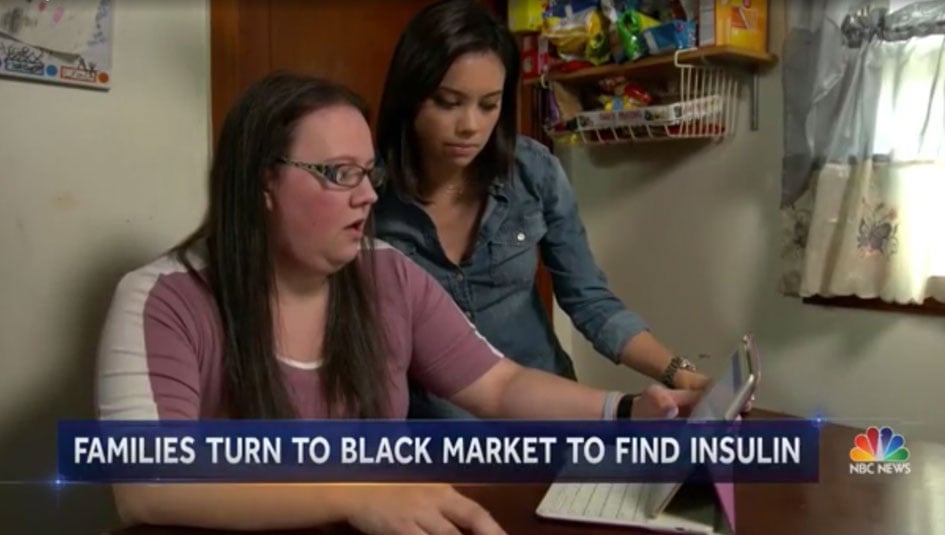NBC “INSULIN BLACK MARKET” Video Story is a Nothing Sandwich

4/25/2017 – 4:00 p.m. This story has been updated to include discussion of the print version of the video report in question.
Opinion
Recently, the major news networks have been picking up on the storyline that insulin is very, very, very expensive. Only problem is that their reports don’t do a deep enough dive on the matter, so all we’re left with is misery porn about the high cost of staying alive with Type 1 diabetes.
Read more: The Type 1 Diabetes News Consumer’s Handbook
NBC Nightly News stepped into this fray with an April 24th report entitled, “As Insulin Costs Skyrocket, Families Turn to Black Market.” (It focused on one family, but whatever, right?) NBC’s social media shortened that title to “INSULIN BLACK MARKET” on their Facebook post, just so you know it’s dramatic.
In this video, we are introduced to a West Virginia mother with a real problem – she has a daughter with Type 1 diabetes who has an apparent allergy to the insulin covered by the family’s insurance. According to the report, the insurer will only cover 25 percent of the cost for a different insurance brand that the girl can tolerate, despite a doctor’s appeal that she deserves full coverage.
Kudos to NBC for drawing attention to this problem. But….
The problem lies in the execution. There is an extreme lack of accountability in the report, as the reporter declines to name names. (The reporter’s name is Jo Ling Kent. See? That wasn’t hard to do.) She says that NBC News reached out to the insulin maker, the family’s insurer, and its policy benefit manager for comment, but doesn’t name any of the three. Without naming them, the report loses any leverage to put pressure on the organizations.
Read: Newscast Punches Up Drama of Insulin Pump Theft
Even the doctor who tried to help isn’t named, so they can’t get the credit deserved for an attempt at advocacy, either. We attempted to reach out to Ms. Kent via email for comment, but she has not responded.
And then there is the drama of the “BLACK MARKET” Facebook group, which is also, not surprisingly, unnamed. The only hint that we get of its identity is a camera shot of the mother scrolling through Facebook groups; her browser rests on the group, “Pay it Forward – Diabetes US Only.” Ms. Kent introduces us to the Facebook group that is the focus of the report with this narration: “The soaring cost has forced her parents to go underground to get the drug through a secret Facebook group.”
Okay, no. If it is “Pay it Forward – Diabetes US Only”, then it’s not secret. Anyone can find the group and ask to join, including law enforcement. No identities are hidden in this group, either. Also, the group’s rules say, at least for the record, that you are only allowed to sell items that are sold over the counter; users can also donate or trade. And it’s hardly a massive underground black market – the group has a bit more than 2,200 members. The exchanges happening on this Facebook group may be outside of legal rules, but it’s hardly as dramatic as the report makes it out to be.
And what’s infuriating is that NBC News had all this good, in-depth, deep dive information in their written version of this story, but decided not to include it in the video report (insulin maker – Sanofi, insurer – PEIA, and PBM – CVS Caremark, if you’re keeping score). Names were named, and context given.
Why is this a problem? Let me answer this by asking you how often you read something from NBC News. Probably not often. I even tried to Google a print version of this story when I was first putting this opinion story together, and I didn’t find it. NBC News is primarily a visual storyteller, and the video is being shared much more than the print article.
So with an absence of names and a punched-up drama, we are once again treated to images of a crying mother and a girl looking innocent and wistful as terrible things play out around her. It’s certainly possible that stories like these may raise awareness of the high cost of insulin, but they also portray people with Type 1 diabetes as exploitable victims without helping the public understand or address the market forces that make the cost of Type 1 diabetes so high.
Thanks for reading this Insulin Nation article. Want more Type 1 news? Subscribe here.
Have Type 2 diabetes or know someone who does? Try Type 2 Nation, our sister publication.